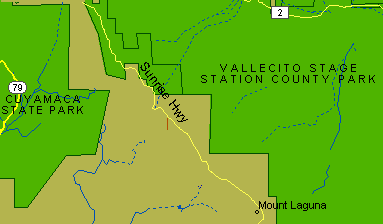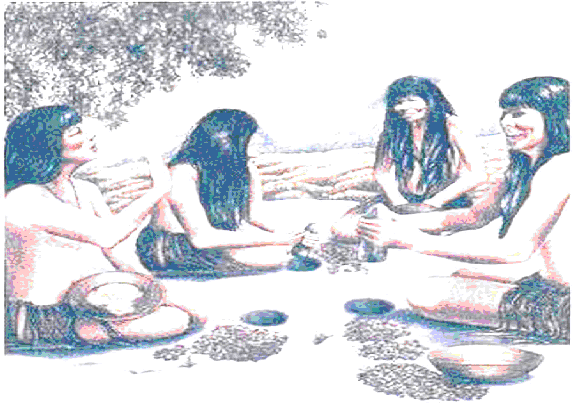|
01/16/2005
- SAN DIEGO CA
Edited by Roy Cook
This review is obliged to credit a recent article by Anne Krueger in
the San Diego Union. At issue is American Indian Rights head to head
against public use of State park facilities. State park officials are
studying whether to rebuild the campground at its present location or
move it to a nearby meadow. When the Los Caballos horse camp was built
more than 50 years ago, there were few regulations protecting the environment
or American Indian artifacts. But after the camp at Cuyamaca Rancho
State Park burned in the October 2003 wildfires, representatives of
Indian tribes raised concerns about rebuilding on land that is the site
of an American Indian village and burial ground.

"When the campground went in, it was a time when there was no awareness
for archaeology or Native American cultural issues," said Carol Gaubatz,
an analyst with the state Native American Heritage Commission. "If we
went in there today, the likelihood that the campground would be put
in is very slim."
Local equestrians, eager to have the popular camp reopened, want
the camp rebuilt at its present spot. Mat Fuzie, Park District Superintendent,
told a group of horse lovers who packed the Descanso Town Hall last
week that he must consider moving the campground as part of a process
to get federal money to pay for the rebuilding. Fuzie said the camp
could be rebuilt on its existing site by fall at a cost of about $500,000.
If the camp is built on another site, it will cost $1 million to $2
million, depending on which location is selected, and could take much
longer. "The pessimist in me says two years," he said. "The optimist
in me says one." With 17 campsites, Los Caballos is booked up to six
months ahead and is considered a model for equestrian camps around the
state, Fuzie said.
Peggy
Martin, a Descanso resident who with her husband, Bernie, organized
the meeting, said the camp suffered relatively little damage during
the fire. Its bathroom burned down, and some fences need repair, but
the horse corrals are still in good condition, she said. "It looked
to us like you could do some cleanup and the camp could be open," she
said. "Why are we moving it and why spend a lot of money and why take
a lot of time? We started asking questions."
Gaubatz
said the land where the horse camp is located was one of the largest
American Indian village sites in the area. After American Indian remains
were found near a bathroom being reconstructed, commission officials
asked that the work stop until a decision could be made about moving
the camp, she said. The village at the site was known by its Indian
name of Ah-ha Kwe-ah-mac, and it was a gathering place for four tribes:
Santa Ysabel, Ewiiaapaayp, Manzanita and the Laguna band of the Kwaaymii
tribe, said attorney Courtney Coyle. Coyle represents Carmen Lucas,
an elder with the Kwaaymii tribe.
 Land
use patterns for a bandís territory extends anywhere from 10 to 30 miles
along a stream and tributaries. It includes trails for all members,
general hunting, religious, ceremonial and common areas for democratic
useage. Generally peaceful by nature, the Kwaamii custom and tradition
is distinguished by tolerance and individual freedom. Land
use patterns for a bandís territory extends anywhere from 10 to 30 miles
along a stream and tributaries. It includes trails for all members,
general hunting, religious, ceremonial and common areas for democratic
useage. Generally peaceful by nature, the Kwaamii custom and tradition
is distinguished by tolerance and individual freedom.
Further, Coyle said, "Out of respect, we have an opportunity with the
fire to undo an old wrong. The question we need to be asking ourselves,
given today's environmental laws, is this the right location for this
type of recreational use?"
Fuzie
said that after the wildfires, the state parks department developed
a schizophrenic attitude about Los Caballos. Some department employees
said the horse camp should not be located on the American Indian village
site, while others wanted to reopen the popular camp. He said Los Caballos
is a top priority for rebuilding in the park. More than $5.5 million
has been set aside to pay for park rebuilding expenses that aren't covered
by funds from the Federal Emergency Management Agency.
Two rare plants also are located on the horse campsite, and moving the
camp would restore their habitat, Fuzie said. He added that a series
of public hearings must be held in order to obtain FEMA money to rebuild
the park. He emphasized that the meeting in Descanso was not part of
the public review, only to provide information to the equestrians.
|



